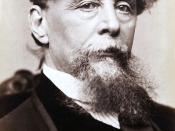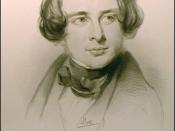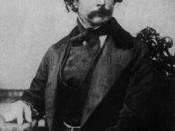A Magnetic Attraction:
Contrasting Philosophies of Mr. Sleary and Mr. Gradgrind
Although a positive charge and a negative charge are polar opposites, when they are placed in close proximity to each other a strong energy is created forcing the two charges to form a solid bond. This proven scientific theory which society has applied to everyday life leads to the saying that opposites attract. Opposing cultures, tastes and opinions can actually benefit a relationship by introducing each person to a whole new perspective. Contrasting personalities is a positive situation; nobody wants to date themselves, after all. It is most commonly said that relationships flourish when a couple displays varying opinions and lifestyles. This divergence allows for positive variance, which removes the monotony in an ordinary situation and adds a sense of connection. In order to create a structured, well-balanced novel, Charles Dickens provides characters who encompass widely varying ideals; however, this discontinuity results in an energetic and strong story.
Perhaps the most dissimilar characters in Dickens's Hard Times are Thomas Gradgrind and Mr. Sleary. Thomas Gradgrind thinks of himself as an "eminently practical" man and believes that only fact and figure are important (12). In contrast, Mr Sleary believes life should not be all work and no play. As a result, the characters learn and grow from one another. These divergent philosophies complement each other, balancing out the novel while stimulating the reader's interest.
Dickens opens the novel by describing the physical appearance and demeanor of Thomas Gradgrind. He repeatedly refers to Mr. Gradgrind's features as square, insinuating that everything about him is straight forward. Dickens's writes, "...and the speaker's square forefinger...square wall of a forehead...square coat, square legs, square shoulders" (5). This uptight and clear-cut description lends to Mr. Gradrind's similarly precise philosophy on life. The reader can...


